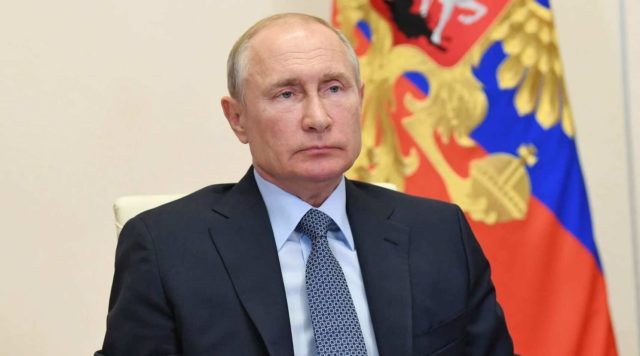
Russia may retaliate against US Russia's President Vladimir Putin. (Alexei Nikolsky/Russian Presidential Press and Information Office/TASS/Abaca Press/TNS)
U.S. intelligence sources believe Russia may retaliate against the U.S. for punishment through economic sanctions for its invasion of Ukraine. New comments on Russian state-run television channels have also hinted at such plans.
The U.S. and other western nations have applied dozens of new economic sanctions to punish Russia’s actions in Ukraine, and Russia is looking for ways to retaliate. Over the weekend, U.S. intelligence sources told The Associated Press they believe Russia may use the new U.S. sanctions as a justification for interfering in the 2022 U.S. midterm elections.
According to the Associated Press’s sources, intelligence agencies have not yet found any evidence that Russian President Vladimir Putin has authorized any efforts to interfere in the U.S. elections. As such, it isn’t clear which candidates Russia may try to promote in the midterm elections.
While the Associated Press’s intelligence sources were not ready to name any specific candidates Russia may support through election interference efforts, the Daily Beast noted several examples of Russian state-media personalities speaking in favor of former Republican President Donald Trump.
In March, Daily Beast Columnist Julia Davis tweeted a segment from a Russian media panel, “Meanwhile on Russian state TV: Host Evgeny Popov says it’s time for the Russian people to call on Americans to change ‘the regime in the U.S.’ before its term expires ‘and to again help our partner Trump to become President.'”
Meanwhile on Russian state TV:
Host Evgeny Popov says it's time for the Russian people to call on Americans to change "the regime in the U.S." before its term expires "and to again help our partner Trump to become President."https://t.co/orPMoKoxwG pic.twitter.com/sPVDhVWm6Q— Julia Davis (@JuliaDavisNews) March 29, 2022
Davis noted another segment on the Russian state-television program “The Evening With Vladimir Soloviev,” in which guest Malek Dudakov said, “When things thaw out and the presidential race for 2024 is firmly on the agenda, there’ll be moments we can use.”
Dudakov, who is an analyst of U.S. topics, said, “The most banal approach I can think of is to invite Trump—before he announces he’s running for President—to some future summit in liberated Mariupol.”
Mariupol is currently the site of intense fighting between Russian and Ukrainian forces and neither side has firm control over the area.
Dmitry Drobnitsk, another U.S. analyst on the same segment, suggested Russia could also invite former Rep. Tulsi Gabbard (D-HI) to the hypothetical Mariupol summit.
“Tulsi Gabbard would also be great. Maybe Trump will take her as his vice-president?” Drobnitsk said.
While Russian state television personalities have spoken favorably about Trump and Gabbard, the favorable coverage may be aimed more at elevating political divisions within the U.S. than expressing a preference for any one candidate’s specific political views.
“With America, we should be working to amplify the divisions and—in light of our limited abilities—to deepen the polarization of American society,” Dudakov said, during his Soloviev show appearance. “There is a horrific polarization of society in the United States, very serious conflicts between the Democrats and Republicans that keep expanding. You’ve already mentioned that America is a dying empire—and most empires weren’t conquered, they were destroyed from within. The same fate likely awaits America in the near decade. That’s why, when all the processes are thawed, Russia might get the chance to play on that.”
Russian interference, or even the allegation of Russian interference in past U.S. elections, has stoked U.S. political division.
Allegations of collusion between the Trump campaign and Russia in the 2016 election, led to a two-year investigation by Special Counsel Robert Mueller. The investigation ultimately established no specific collusion between the Trump campaign and the Russian government. Throughout the investigation, Trump insisted he was the victim of a “witch hunt.”
In August 2020, FBI lawyer Kevin Clinesmith pleaded guilty to altering documents the agency relied on to extend a warrant to surveil a member of Trump’s 2016 campaign for possible Russian ties.
In October 2020, after the New York Post published the contents of a laptop reportedly belonging to then-candidate Joe Biden’s son Hunter Biden, 51 former U.S. intelligence officials signed a joint letter that said the materials the New York Post had reported bore a resemblance to a “Russian information operation.” Politico subsequently reported on the letter from the former intelligence officials with the headline “Hunter Biden story is Russian disinfo, dozens of former intel officials say.”
While the former intelligence officials characterized the laptop as a possible Russian effort to sway the 2020 election, several other major U.S. publications have since authenticated some of the materials on the laptop. After other news outlets worked to authenticate the laptop, the New York Post reached out to the signatories of the intelligence community letter, but most declined to respond and the few that did were not apologetic about their previous characterizations of the New York Post’s reporting.




